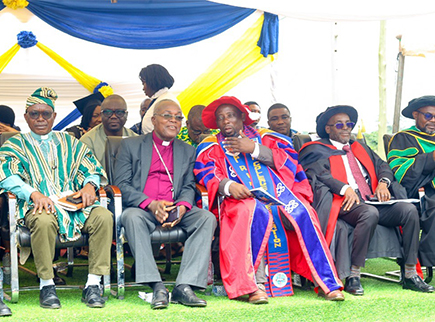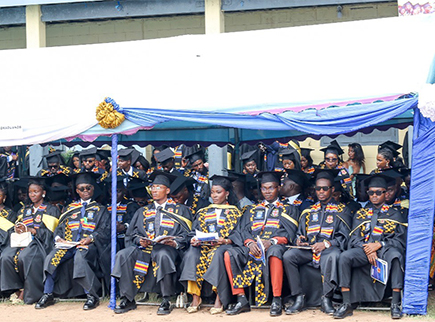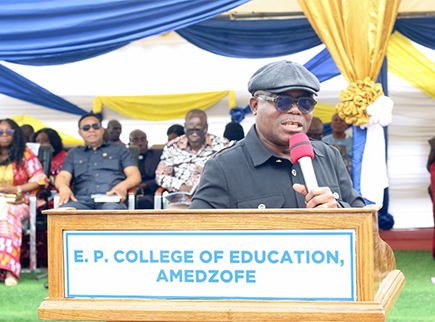Dr. Harry L. K. Agbanu, Chairman of the Governing Council of the University of Professional Studies, Accra (UPSA), has challenged Ghana’s teacher training institutions to embrace Artificial Intelligence (AI) as a tool to improve teaching and learning, while stressing that the role of the teacher remains irreplaceable.
Speaking as Guest Speaker at the 17th Congregation of the Evangelical Presbyterian College of Education (AMECO), Amedzorfe, Dr. Agbanu said AI is rapidly transforming education across the globe, making learning more interactive, efficient, and inclusive.
It was under the theme, “79 years of quality teacher education: The impact of Artificial Intelligence in enhancing delivery.”
He explained that AI had the potential to personalise lessons, automate assessments, and identify learning gaps, thereby making teaching more responsive to the needs of learners.
“Across the world, Artificial Intelligence is personalising learning, automating assessments, and helping teachers deliver more efficiently. But AI cannot replace the teacher. It only amplifies their role as facilitators, mentors, and human guides,” he stated.
Dr. Agbanu cited UNESCO statistics indicating that over 47 per cent of educational institutions worldwide were already adopting AI in teaching and learning.

He noted that Ghana could not afford to lack behind, especially when government policies such as the Education Strategic Plan (2018–2030) and the Ministry of Education’s digital literacy programmes had already paved the way for integration of technology in schools.
He urged the graduates to see themselves as custodians of knowledge and transformation. “Today, you are not just leaving with degrees; you are leaving with a mandate to shape minds, inspire generations, and contribute to national development,” he stressed.
Professor Augustine Ocloo, Acting Deputy Director-General of the Ghana Tertiary Education Commission (GTEC), who chaired the ceremony, praised the graduates for their resilience and urged them to embrace technology to remain relevant in the digital age.
Prof. Ocloo explained that the oversight role of GTEC had become critical following the dissolution of governing councils under the Presidential Transition Act.
He said: “I bring you greetings from the Director-General of GTEC. Let me remind you that the role of the teacher is evolving. Teachers who embrace AI will replace those who don’t. You must prepare yourselves for this new reality.”
The GTEC official reaffirmed the Commission’s support to colleges of education in adopting digital literacy, AI, and modern pedagogical tools.
Dr. Dickson Tsey, Principal of AMECO, in his address, described the congregation as both a celebration of academic achievement and a reflection on the institution’s legacy of value-based teacher training.
“Artificial Intelligence is no longer distant; it is here with us. As a training institution, we must lead in harnessing its benefits while maintaining our values-based training,” Dr. Tsey said.
He announced that a total of 353 students graduated, comprising 266 Bachelor of Education (Junior High School) specialists and 69 Bachelor of Education (Primary) specialists.
“For the first time in the history of this College, 27 students graduated with First Class honours, an improvement from last year’s 10, describing it as stellar performance thanks to the commitment and dedication of our hardworking lecturers,” he noted.
The Principal also highlighted staff strength, stating that AMECO had 49 teaching and 56 non-teaching staff. He acknowledged the government’s support for recruitment but appealed for additional clearance, particularly in the non-teaching category.
Dr. Tsey revealed that more than 90 per cent of AMECO’s staff were currently pursuing doctoral studies in line with directives from the Ministry of Education and GTEC.
“Already, one of our lecturers has successfully graduated with a PhD, while another has defended his thesis and awaits graduation,” he added, noting that workshops and seminars had also been organised to enhance staff capacity.
He expressed gratitude to the government, GTEC, alumni, and traditional authorities for their support in sustaining the institution’s mission of producing disciplined and competent teachers.
The colourful ceremony, held on the serene hills of Amedzorfe, also featured a valedictory address by Master Enock Atigbor, who recounted the struggles and triumphs of his graduating class.
Master Atigbor also reflected on challenges such as lecturers’ strikes, academic pressures, and the strict disciplinary culture of the college, which he said sometimes felt like military training.

He however praised AI platforms such as ChatGPT for helping students access information when learning materials were scarce, calling it “a miracle tool that supported our survival.”
The valedictorian paid tribute to colleagues who passed away during study, describing them as “fallen heroes” whose memories would remain part of AMECO’s legacy.
He also thanked lecturers, families, and friends for their unwavering support, and urged his colleagues to use their knowledge to impact society positively.
“As teachers, success is not measured by what we achieve for ourselves, but by what we give to the world. Each of us has the potential to create change and to make our alma mater proud,” Master Atigbor said.
The congregation ended with words of encouragement from the college leadership and renewed commitment from graduates to join the alumni network in supporting AMECO’s future development.

